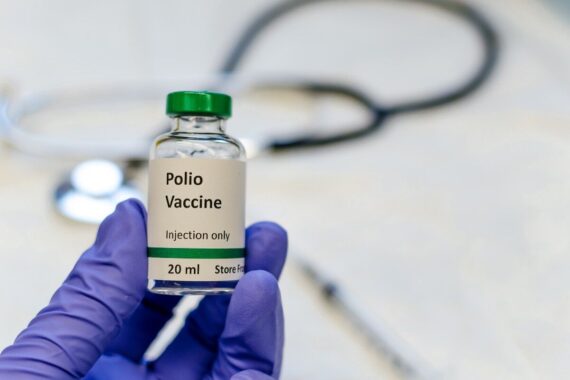A polio vaccine catch-up campaign will be launched in London during the summer term, say public officials, because uptake in some boroughs is still too low.
The UK Health Security Agency added that their sewage surveillance testing does show signs of reduced transmission.
But World Health Organization requires evidence of 12 months of zero detections before the UK is no longer considered to be a polio ‘infected’ country, UKHSA said.
It follows an urgent polio booster campaign launched last summer after virus was detected in several sewage samples. Further sampling found that the virus had continued to spread in the community and evolved into a vaccine-derived poliovirus type 2, which can cause serious illness.
Vaccination rates in London remain lower than the rest of the country with 87.6% of children receiving all their polio vaccinations one year compared to 92.1% in England as a whole.
Uptake for the preschool booster for children aged five is 69.9% in London compared to 83.4% in England, figures show
The NHS in London will deliver the catch-up campaign, offering polio jabs and other routine childhood vaccines including MMR to unvaccinated or partially vaccinated children aged one to 11.
Children will receive vaccines through a combination of primary school and community clinics, with a particular focus on supporting communities with the lowest levels of vaccine uptake, UKHSA said.
Surveillance has detected no further vaccine-derived poliovirus type 2 isolates since November, suggesting transmission in London has significantly reduced. There have been no reports of paralytic polio.
Dr Vanessa Saliba, consultant epidemiologist at the UKHSA, said: ‘While there are early signs of reduced spread of the poliovirus in London, we need to continue to improve uptake of childhood vaccines in all communities.
‘Until we reach every last child, we cannot be sure that we will not see a case of paralysis.
‘Even a single case of paralysis from polio would be a tragedy as it is completely preventable.
‘Only by improving vaccination coverage across all communities can we ensure resilience against future disease threats.’
Jane Clegg, chief nurse at NHS London, urged all parents in London to check their child’s red book or contact their GP Practice to get up to date with their polio vaccination schedule.
‘In addition, from the summer term, polio vaccination will be offered through primary school and community clinics for one-to-eleven year olds.’
















